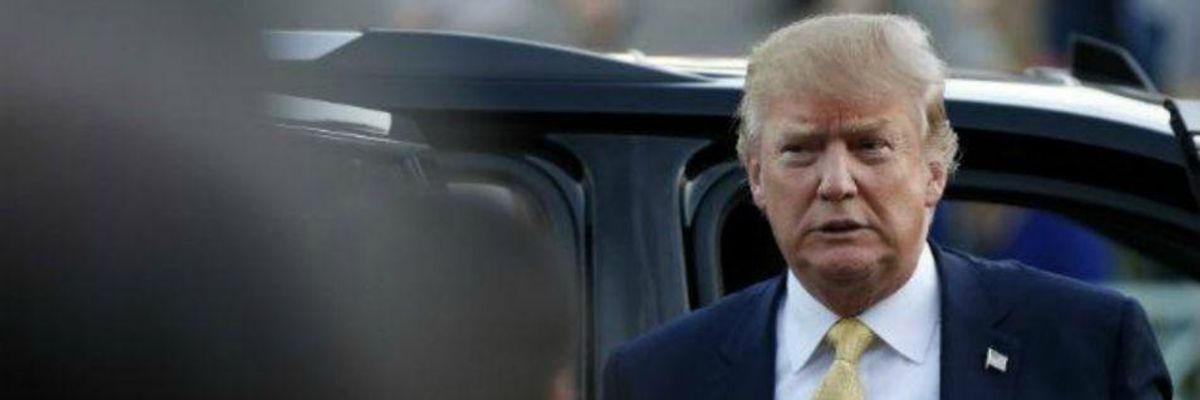With his blowsy hair, pinstripe suits, and brash New York attitude, Donald Trump resembles nothing so much as a gunslinging cowboy. Rick Perry may have presented himself as the real Westerner in the Republican presidential primary, but it's the Donald's campaign mythos that most closely resembles a classic Western.
He is the bronco-buster striding into town, looking for justice, willing to stand up to the corrupt sheriff and the local railroad bossman.
The Donald has freely accused his opponents of being part of the corrupt town gang he's here to stare down.
Hilary, Jeb and Scott and Marco: "It's like puppets...bing, bing," Trump says. "They're totally controlled, totally controlled by special interests, lobbyist, and donors. They're totally."
But not the Donald. He wears a white ten-gallon hat.
According to the Donald's understanding of corruption, anyone who accepts money during their campaign is inevitably corrupt. (It's the opposite of the Supreme Court's vision that campaign contributions actually tie candidates closer to the people).
Following his logic, if we want a corruption-free democracy only billionaire politicians will do. If he's right, then we're in bigger trouble than we thought. In the last seven federal elections only 206 of 11,644 candidates were self-funding millionaires.[1] Cumulatively, they spent more than $638 million running for office. But they did not have a spectacular win-loss record. Only 20 of them won.
If the Donald is right and if the public is aching for untainted politicians, wouldn't you expect a higher win rate?
The Donald is certainly staking a fair amount of his winning appeal on a reputation for being so rich he can't be bought.
Given the polls, this would seem to be a smart move. Seventy-eight percent of the population think reducing the role of money in politics is important. Only 18 percent believe congressmen care what their constituents think.
But one study suggests self-funded candidates are actually less likely to win. In an analysis of 157 open-seat elections between 1996 and 2002, one researcher found that a candidate's chances of success were actually diminished by self-funding.
It doesn't seem that voters held self-financing against the candidate. But the study suggests the problem with self-funding might be that the candidate fails to enter the positive money and politics feedback loop. "Self-financing may deter candidates from gaining the political value of linkages to interest groups, community leaders, and even individual voters..."
So we're back to a Manichean vision of money in politics. Trump's version: campaign contributions are inherently corrupting. The Supreme Court's vision: campaign contributions are democracy enhancing.
There is not much empirical evidence that self-funded candidates behave differently in those rare cases when they make it to Congress. Wisconsin provides a case in point. No other state has produced as diverse a crop of politicians from a campaign finance perspective.
From 1957 to 1986, the state overwhelmingly sent William Proxmire to the Senate. Proxmire was a legendary cheapskate. In his last election, in 1982, he turned down all campaign contributions and spent a total of $145.10 on the race. He won with 62 percent of the vote.
Herb Kohl, the multi-millionaire former owner of Kohl's department stores and the Milwaukee Bucks basketball team, succeeded him. Kohl funded his own race: "Nobody's Senator But Yours." And he ran unique campaigns. Politifact actually rated as mostly true his claim to have never run a negative campaign. (Full disclosure: I worked for Kohl for four years and highly esteem him). He, like Proxmire, always won his races by substantial margins before retiring in 2012.
For most of Kohl's time in the Senate his fellow Wisconsinite was Russ Feingold, a legendarily independent Democrat. In 2010, Feingold ran for reelection against Ron Johnson, a millionaire businessman. Johnson put more than $8.5 million of his own money in the campaign -- 57 percent of the total. And he won.
Altogether, Wisconsin's Senators are not like the others when it comes to paying for their campaigns. But when it comes to voting in the Senate, they are much like all other Senators. In the two-year session that they served together, Kohl and Johnson hewed closely to their political party's positions. Kohl voted in line with his fellow Democrats 94 percent of the time, and Johnson voted in line with his fellow Republicans 84 percent of the time.[2] (The average Democratic Senator also voted with the party 94 percent of the time, while the average Republican Senator voted with the party 84 percent of the time).
Writ large, party affiliation might be a better predictor of behavior than fundraising sources. Even the notoriously independent Feingold voted with his party 84 percent of the time during his years in office.
Maybe Trump has come to this realization, too. Gaining in the polls and facing the prospect of a staggeringly expensive campaign, in the last few weeks Trump attended one fundraiser and began collecting donations online. Likewise, Ron Johnson, who is up for reelection in 2016, has announced he will not fund his campaign again.
Billionaire politicians: they're just like all the others.
Notes:
[1] I define a self-funding candidate as someone who personally contributed 50 percent or more of their campaign funds, not including outside spending.
[2] Party line voting is a limited measure of a Senator's activities. A fuller analysis would include examining the Senator's committee behavior and ancillary official acts, e.g. letter sending and exertion of office influence. For example, a self-funding Senator might do fewer "favors" for big donors, e.g. letters to agencies asking supporting government contract bids. But such letters are not publicly available. For now, voting records are the best available measure.


